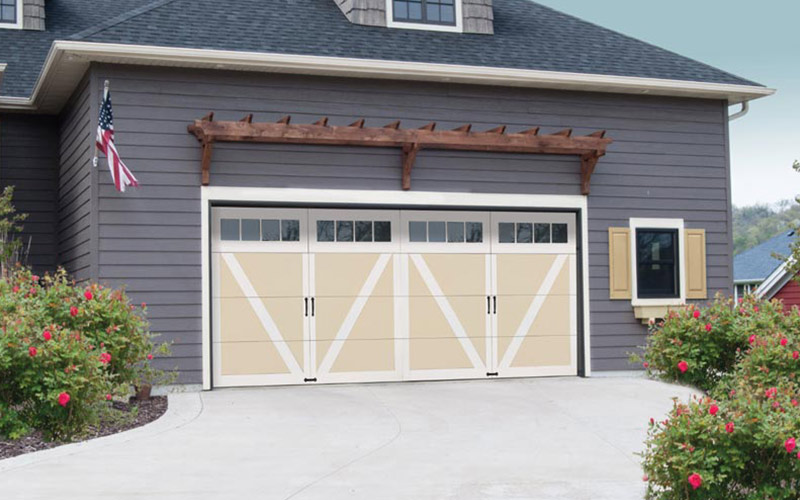Winter can pose unique challenges for various aspects of your home, and your Garage Door Repair Livonia MI is no exception.

The colder temperatures, moisture, and potential ice accumulation can impact the performance of your garage door system. In this article, we’ll explore common garage door repair issues that arise during winter and provide tips on how to address and prevent them.
1. Frozen Weather Stripping:
Weather stripping along the bottom of your garage door helps prevent drafts, debris, and moisture from entering the garage. In cold temperatures, the weather stripping can freeze to the garage floor, making it challenging for the door to open. To prevent this, regularly inspect and clean the weather stripping, and consider applying a silicone-based lubricant or de-icing solution to keep it pliable.
2. Stiff or Frozen Rollers:
The rollers along the tracks of your garage door can become stiff or frozen in cold weather, leading to difficulty in opening or closing the door. To address this issue, lubricate the rollers with a garage door lubricant specifically designed for cold temperatures. Avoid using grease or oil, as these can thicken in the cold and exacerbate the problem.
3. Contracting Metal Parts:
Metal components, such as springs, hinges, and tracks, can contract in colder temperatures, affecting the smooth operation of your garage door. Regularly lubricate these metal parts to reduce friction and help prevent them from seizing up. Use a high-quality garage door lubricant that won’t solidify in cold conditions.
4. Malfunctioning Garage Door Opener:
Cold temperatures can impact the performance of your garage door opener. If you notice that your opener is struggling or not responding during winter, check for loose or damaged wiring, and ensure that the opener is free from ice or snow accumulation. Consider upgrading to a garage door opener designed for cold climates, and regularly check and replace the batteries in remote controls.
5. Ice Accumulation on the Tracks:
Ice buildup on the garage door tracks can impede the smooth movement of the door. To prevent this issue, keep the tracks clean and free from debris. If ice has already formed, use a de-icing solution to melt it, and then carefully remove any remaining ice with a plastic shovel or scraper. Avoid using metal tools that could damage the tracks.
6. Misaligned Sensors:
Garage door safety sensors may become misaligned during winter, causing the door to reverse unexpectedly or not close properly. Ensure that the sensors are clean and properly aligned. Remove any snow or ice covering the sensors and their lenses. Regularly check and maintain the proper alignment to ensure the safety features of your garage door are functioning correctly.
7. Tension Issues with Springs:
Cold temperatures can affect the tension in your garage door springs, leading to issues such as the door being difficult to lift or closing too quickly. If you suspect a problem with the springs, it’s crucial to seek professional assistance. Springs are under high tension and can be dangerous to handle without the proper knowledge and tools.
8. Cracked or Brittle Seals:
Rubber seals on your garage door can become brittle and crack in cold weather, allowing cold air, moisture, and pests to enter the garage. Inspect the seals for any signs of damage and replace them if needed. Applying a silicone-based lubricant can help keep the seals flexible and prevent cracking.
9. Power Outages:
Winter storms can lead to power outages, leaving you unable to operate your garage door if it relies solely on electricity. Consider investing in a garage door opener with a battery backup system. This feature ensures that your garage door remains operational even during power outages, providing convenience and security.
10. Sagging or Warping Door Panels:
Extreme temperature fluctuations in winter can cause garage door panels to contract and expand, leading to sagging or warping. Regularly inspect the panels for any signs of misalignment or damage. If you notice issues, consult a professional to assess and repair or replace the affected panels.
Preventive Measures to Avoid Winter Garage Door Issues:
Preventive Maintenance:
Conduct regular preventive maintenance on your garage door system before winter arrives. This includes lubricating moving parts, checking weather stripping, and ensuring that all components are in good condition.
Insulation:
Consider insulating your garage door to regulate the temperature inside. Insulation helps prevent freezing and can make your garage more energy-efficient.
Professional Inspection:
Schedule a professional inspection before winter to identify and address potential issues. A trained technician can ensure that your garage door is winter-ready and make any necessary adjustments or repairs.
Keep the Garage Warm:
If possible, keep your garage at a moderate temperature during winter. This can help prevent freezing of components and ensure smoother operation.
Snow Removal:
Regularly remove snow and ice from around the garage door and driveway to prevent accumulation. This helps avoid issues such as frozen weather stripping and ice buildup on the tracks.
Conclusion:
By understanding the common Garage Door Repair Livonia MI and implementing preventive measures, you can ensure that your garage door operates smoothly and reliably, even in cold and challenging weather conditions. Regular maintenance, proper lubrication, and attention to potential issues will contribute to the longevity and efficiency of your garage door system throughout the winter months. If you encounter persistent problems, don’t hesitate to seek professional assistance to address and resolve any winter-related issues with your garage door.
Brothers Garage Door Service
29522 Wentworth St, Livonia, MI 48154, United States
1-734-292-0971